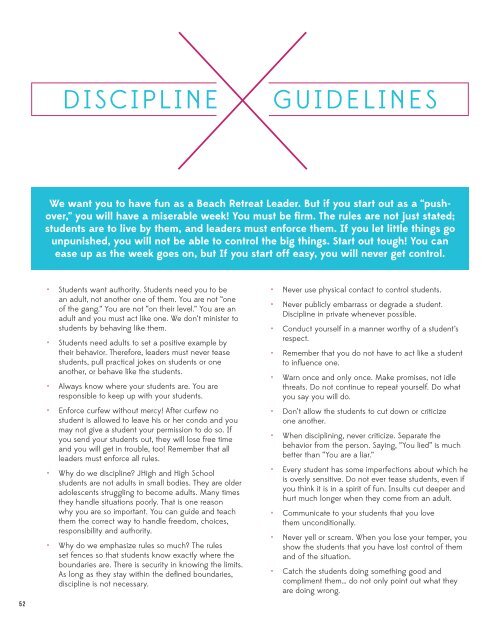2018 Beach Retreat Leader Manual
Create successful ePaper yourself
Turn your PDF publications into a flip-book with our unique Google optimized e-Paper software.
DISCIPLINE<br />
GUIDELINES<br />
We want you to have fun as a <strong>Beach</strong> <strong>Retreat</strong> <strong>Leader</strong>. But if you start out as a “pushover,”<br />
you will have a miserable week! You must be firm. The rules are not just stated;<br />
students are to live by them, and leaders must enforce them. If you let little things go<br />
unpunished, you will not be able to control the big things. Start out tough! You can<br />
ease up as the week goes on, but If you start off easy, you will never get control.<br />
52<br />
• Students want authority. Students need you to be<br />
an adult, not another one of them. You are not “one<br />
of the gang.” You are not “on their level.” You are an<br />
adult and you must act like one. We don’t minister to<br />
students by behaving like them.<br />
• Students need adults to set a positive example by<br />
their behavior. Therefore, leaders must never tease<br />
students, pull practical jokes on students or one<br />
another, or behave like the students.<br />
• Always know where your students are. You are<br />
responsible to keep up with your students.<br />
• Enforce curfew without mercy! After curfew no<br />
student is allowed to leave his or her condo and you<br />
may not give a student your permission to do so. If<br />
you send your students out, they will lose free time<br />
and you will get in trouble, too! Remember that all<br />
leaders must enforce all rules.<br />
• Why do we discipline? JHigh and High School<br />
students are not adults in small bodies. They are older<br />
adolescents struggling to become adults. Many times<br />
they handle situations poorly. That is one reason<br />
why you are so important. You can guide and teach<br />
them the correct way to handle freedom, choices,<br />
responsibility and authority.<br />
• Why do we emphasize rules so much? The rules<br />
set fences so that students know exactly where the<br />
boundaries are. There is security in knowing the limits.<br />
As long as they stay within the defined boundaries,<br />
discipline is not necessary.<br />
• Never use physical contact to control students.<br />
• Never publicly embarrass or degrade a student.<br />
Discipline in private whenever possible.<br />
• Conduct yourself in a manner worthy of a student’s<br />
respect.<br />
• Remember that you do not have to act like a student<br />
to influence one.<br />
• Warn once and only once. Make promises, not idle<br />
threats. Do not continue to repeat yourself. Do what<br />
you say you will do.<br />
• Don’t allow the students to cut down or criticize<br />
one another.<br />
• When disciplining, never criticize. Separate the<br />
behavior from the person. Saying, “You lied” is much<br />
better than “You are a liar.”<br />
• Every student has some imperfections about which he<br />
is overly sensitive. Do not ever tease students, even if<br />
you think it is in a spirit of fun. Insults cut deeper and<br />
hurt much longer when they come from an adult.<br />
• Communicate to your students that you love<br />
them unconditionally.<br />
• Never yell or scream. When you lose your temper, you<br />
show the students that you have lost control of them<br />
and of the situation.<br />
• Catch the students doing something good and<br />
compliment them… do not only point out what they<br />
are doing wrong.


